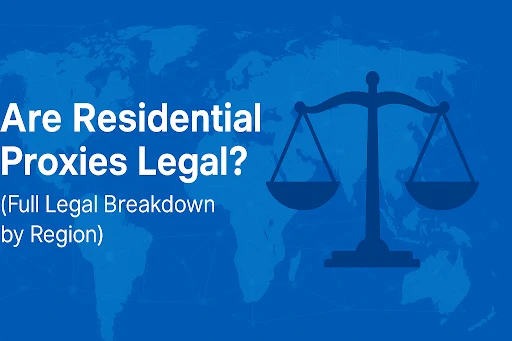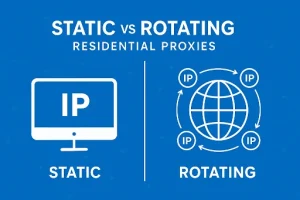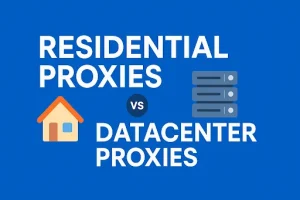
Residential proxies are a powerful tool for marketers, data analysts, and cybersecurity professionals — but one question keeps coming up: 👉 Are residential proxies legal?
The short answer: Yes, residential proxies are legal — if used for ethical, transparent purposes. However, the legality depends on your intent, data source, and regional laws. Let’s break it down region by region.
What Makes a Residential Proxy Legal or Illegal?
A residential proxy is just a gateway IP provided by an Internet Service Provider (ISP) to a real home device. The legality comes down to how it’s used:
✅ Legal Uses:
- Ad verification and SEO audits
- Price comparison and web scraping public data
- Social media or brand protection
- Market research and localization testing
❌ Illegal Uses:
- Hacking or bypassing paid subscriptions
- Stealing data or credentials
- Spamming, fraud, or impersonation
- Evading law enforcement
Think of it like driving a car — the car isn’t illegal, but reckless driving is.
Regional Legal Breakdown
1. United States 🇺🇸
Residential proxies are legal if used for legitimate purposes like marketing, SEO, or security. However, violating a website’s Terms of Service (ToS) or accessing private data without consent can violate the Computer Fraud and Abuse Act (CFAA).
Tip: Always use proxies for public web data and follow data compliance (GDPR, CCPA).
2. European Union 🇪🇺
Residential proxies are allowed, but strict data privacy laws apply under GDPR (General Data Protection Regulation). You can’t collect or process personal data without consent. Even if proxies anonymize your IP, you must ensure you’re not breaching user consent or data rights.
Key Rule: Ethical scraping = public data only, no login-required pages.
3. United Kingdom 🇬🇧
After Brexit, the UK follows its own UK GDPR and Data Protection Act 2018. Residential proxy use is legal, but data misuse or unauthorized access can lead to prosecution under the Computer Misuse Act.
Tip: Avoid scraping websites that explicitly prohibit bots or automated access.
4. Canada 🇨🇦
Canada allows residential proxies, but personal data protection is governed by PIPEDA (Personal Information Protection and Electronic Documents Act). Using proxies to bypass rate limits or collect non-public info violates digital access laws.
Key Takeaway: Transparency and data ethics are key in Canada.
5. Australia 🇦🇺
Residential proxies are not illegal, but misusing them can trigger violations under the Cybercrime Act 2001. As long as you’re using them for lawful business or research, you’re safe.
Example: Using proxies to monitor search rankings across regions = ✅ Using proxies to hack paywalled content = ❌
6. Asia-Pacific
- India: Legal for public web data scraping. Illegal for unauthorized access.
- Japan: Permitted but regulated under cyber laws; businesses use them for brand monitoring.
- Singapore: Allowed under PDPA (Personal Data Protection Act) if you avoid personal data misuse.
- China: Strictly regulated. Unauthorized proxy use can be illegal under cybersecurity laws.
7. Middle East & Africa
- UAE & Saudi Arabia: Heavily monitored. Proxy use for anonymity or restricted site access can be punishable.
- South Africa: Legal under POPIA (Protection of Personal Information Act) for ethical data processing.
When Residential Proxies Become Risky
Even if your country allows proxies, they become risky when:
- The IPs are sourced without owner consent (e.g., hijacked devices)
- You’re scraping sensitive or private data
- You use cheap proxy sellers that don’t verify legality
👉 Always buy from reputable proxy providers with transparent IP sourcing.
How to Use Residential Proxies Legally
- Disclose automation if possible (e.g., in APIs).
- Scrape public data only (no logins or passwords).
- Avoid violating Terms of Service.
- Respect regional data laws (GDPR, CCPA, etc.).
- Rotate IPs ethically and avoid overwhelming servers.
Conclusion
Residential proxies themselves are not illegal — misuse is. Stay within the boundaries of data privacy, respect ToS, and use proxies for legitimate business or research. If your proxy use aligns with transparency and compliance, you’re operating safely.
Frequently Asked Questions
Yes, residential proxies are legal in most countries if used for ethical and transparent purposes such as SEO, ad verification, and public data collection. Illegality arises when used for fraud, hacking, or bypassing restricted systems.
Yes. GDPR and CCPA don’t ban proxies, but they regulate how data is collected. Using proxies to scrape personal or non-consensual data would violate these laws.
This depends on the region. In the U.S. or Europe, using proxies to view geo-restricted content usually violates Terms of Service, not criminal law. However, in countries like China or UAE, it can be considered a legal offense.
Absolutely. Businesses often use residential proxies for SEO monitoring, competitive analysis, and ad verification. The key is to collect public data only and comply with regional data laws.
Unverified proxy providers may source IPs from hacked or infected devices, which can make your usage illegal. Always use reputable, transparent proxy networks that provide consent-based IP pools.



